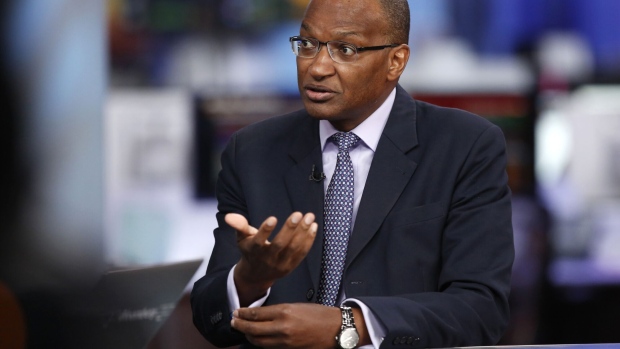Mar 29, 2023
Kenya Surprises by Hiking Rates to Five-Year High Over Inflation
, Bloomberg News

(Bloomberg) -- Kenya’s central bank surprised financial markets by raising borrowing costs to an almost five-year high because of sustained inflationary pressures. Bonds gained.
The monetary policy committee increased its benchmark rate to 9.5% from 8.75%, Governor Patrick Njoroge, who presided over his second last MPC meeting before his term ends in June, said in a statement Wednesday. That was more than the median estimate of six economists in a Bloomberg survey, who forecast a 25 basis-point increase. It was the fourth hike since last year.
Kenya’s 10-year eurobond extended its gains after the decision was announced, with the yield dropping 45 basis points to 11.88% by 7:24 p.m. in Nairobi.
Policymakers acted because “inflation is expected to remain elevated in the near term,” partly because of further increases in electricity prices, he said.
The central bank said that surveys conducted before the MPC met showed declining optimism about business activity and economic growth prospects for the next 12 months.
“Respondents expressed concerns over elevated domestic inflation, the weakening of the Kenya shilling, and high food prices,” Njoroge said.
Kenya joins central banks across the globe from Ghana to the US that are still increasing interest rates to combat high inflation.
Annual price growth in East Africa’s largest economy has breached the ceiling of the central bank’s 2.5% to 7.5% target since June, fueled by a slump in the currency. The shilling has weakened 4.1% this month and is on course for its biggest monthly decline in almost 12 years, according to data compiled by Bloomberg.
In the past week, protesters led by opposition leader Raila Odinga have called on the government to do more to bring down the prices of food and other staples. His supporters are also demanding a rerun of last year’s election, after Odinga narrowly lost to President William Ruto.
The shilling’s depreciation — it’s weakened every month since June 2021 — has prompted the central bank to revive the nation’s interbank currency market. It plans to provide more details at a briefing on March 30.
Read more: Dollar Trading in Kenya Improves as Central Bank Changes Stance
The currency has weakened amid diminishing foreign-exchange reserves, a deteriorating balance of payments, and rising global interest rates that have raised the cost of debt servicing.
Key Insights:
- Long rains will moderate food prices in the coming months. The Horn of Africa region has been battling its worst drought in four decades, which has left millions hungry.
- Leading indicators point to a strong performance in the economy in the first quarter. The economy is expected to remain resilient in 2023, despite global uncertainties over Russia’s war in Ukraine and banking stability.
- Foreign-exchange reserves plunged to $6.49 billion from $7 billion in January. That’s equivalent to 3.62 months of import cover, the lowest in more than 11 years.
- Growth in private-sector credit decreased to 11.7% in February from 12.7% in December due to reduced demand for loans.
- Bank’s asset quality deteriorated. The ratio of gross non-performing loans to gross loans was 14% in February, compared with 13.3% in December.
(Updates with bond movement in paragraph four. An earlier version corrected size and scope in third bullet)
©2023 Bloomberg L.P.






